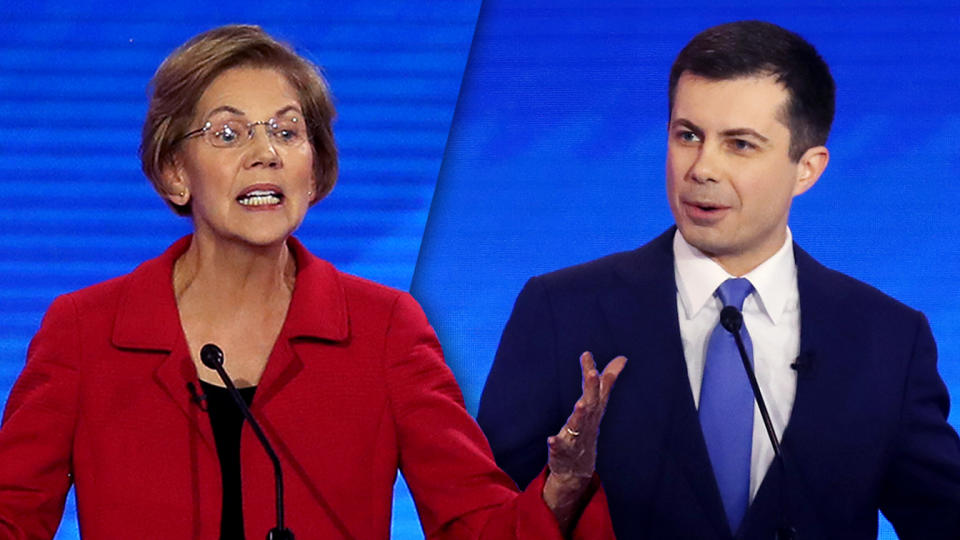Warren and Buttigieg clash over former mayor's record on race
- Oops!Something went wrong.Please try again later.
Pete Buttigieg, a newly minted frontrunner in the Democratic presidential race, had a difficult time at Friday’s debate explaining statistics that showed disproportionately high arrest rates for African-Americans for marijuana possession during his tenure as mayor of South Bend, Ind.
Asked to account for the statistics by ABC News moderator Linsey Davis, Buttigieg launched into a notably long-winded answer that seemed to veer off course.
“The reality is that, on my watch, under my leadership, drug arrests in South Bend were lower than the national average, and specifically to marijuana, lower than in Indiana,” Buttigieg began. “But there is no question that systemic racism has penetrated to every level of our system, and my city was not immune. I took a lot of heat for discussing systemic racism with my own police department, but we’ve got to confront the fact that there is no escaping how this is part of all of our policies.
“Earlier we are talking about opioids and, thankfully, America has come to a better understanding that opioid addiction is best understood as a medical problem,” Buttigieg said, “but there are a lot of people, including African-American activists in my community, who have made the very good point: It’s great that everybody’s so enlightened about drug policy now when it comes to opioids, but where were you when it came to marijuana, where were you when it came to the crack epidemic in the 1990s?”
He went on to discuss his proposal to “end incarceration as a response to possession and make sure that we legalize marijuana,” but was interrupted by Davis, asking him to respond to the question about arrest rates on his watch.

“And again, the overall rate was lower —” Buttigieg began. “One of the strategies that we adopted was to target cases where there was gun violence and gang violence, which was slaughtering so many in our community, burying teenagers, disproportionately black teenagers. We adopted a strategy that said that drug enforcement would be targeted in cases where there was a connection to the most violent group or gang connected to a murder. These things are all connected, but that’s the point. So are all of the things that need to change in order to prevent violence and remove the effects of systemic racism not just from criminal justice but from our economy, from health, from housing and from our democracy itself.”
Davis then turned to one of his rivals for an opinion on that belabored response.
“Senator Warren, was that a substantial answer from Mayor Buttigieg?”
“No,” Warren replied crisply, to applause from the audience at St. Anselm College. After a beat, Warren continued, as Buttigieg, at the adjacent lectern, glared at her. “You have to own up to the facts. And it is important to own up to the facts about how race has totally permeated our criminal justice system. You know, for the exact same crimes, study after study now shows that African-Americans are more likely than whites to be detained, to be arrested, to be taken to trial and convicted and be sentenced to harsher sentences. We need to rework our criminal justice system from the very front end on what we make illegal, all the way through the system and how we help people come back into the community. But we cannot just say that criminal justice is the only time we want to talk about race, specifically. We need to start having race-conscious laws.”
Buttigieg had a strong showing in the Iowa caucus, where he virtually tied for first place with Sen. Bernie Sanders. Warren finished third.
_____
Read more from Yahoo News:




